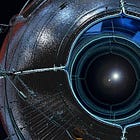TLTD #18 - Looking back at 2024
A framework for end of year reflections
…and that’s a wrap for 2024. Today is my last working day for the year and as such I’ve shared my reflections with my immediate team. In the hope this framework is useful to others, I’m sharing it here. If you end up using it, I would love to hear how it has worked out for you.
Beyond Goals
Over the years, I’ve been through a lot of quarterly and yearly reviews which focus on OKRs, ticking off the ones we have achieved and bringing the ones we haven’t forward into the new year (or just archiving them if they weren’t a good idea to begin with). And that’s a good thing.
However, there is a lot more that happens which isn’t captured in OKRs. That’s why I think taking the time to do an end of year reflection exercise can be beneficial. It will unearth those little nuggets that made a big difference for you and your teams.
For instance, when looking at our product deliverables, we smashed our goals! But when thinking through what else we’ve done, we have also made our product more stable and secure, in addition to hitting our financial milestones — so we have gotten more efficient, with tangible cultural improvements. This is a good insight, and you can take these learnings to other teams and different parts of the org.
The focus of your year-end reflection
While OKRs help track what we've achieved, they rarely capture how we've evolved as engineers and leaders. This framework helps surface those valuable insights that often hide between the metrics. Each time I use it, I tweak it ever so slightly, so feel free to use it as a starting point; but don’t be afraid to change it to work for you. Year on year, your focus areas might change as your org and teams evolve and mature.
1. Technical excellence
This area focuses on your team's engineering achievements throughout the year. Sure, you shipped a lot of value, but have you done that in a sustainable way? Have you made some bets to validate unproven ideas?
The goal is to understand how your technical decisions shaped both your technology landscape and your team's capabilities. What decisions may have seemed small but had cascading effects - both positive and negative.
2. Team Dynamics
How does your team work together? How does it work with external stakeholders? Conversely, what are your stakeholders’ perception of your teams?
This is where we examine the human operating system of your org. How do your teams collaborate differently now compared to a year ago? Who are the emerging leaders? What are the communication channels that evolved naturally, and where did information get lost?
3. Learning
Here we're looking at your team's ability to absorb, adapt, and apply new knowledge.
This area usually reveals insights on how you can help foster an environment where learning is encouraged. But it also highlights conditions that prevent learning — such as running at 100% capacity, a topic for another day. This will reveal when learning happened organically versus when it needed a more structured approach. This is all about identifying the environmental factors that influence your team's development.
4. Impact
Finally, this is where we connect your teams’ work to tangible business and user outcomes. How did the technical decisions you made throughout the year impact the real world? The whole team should develop a deep understanding of the value they have created. Where did technical excellence lead to business success? — and where it didn’t. This helps you prioritise your focus in the new year as you work towards your technology strategy.
Overall, these four dimensions broadly align with my 4 pillars of engineering management which I’ve written about before. You can read that article below:
Your action plan
It doesn’t have to be perfect; it just needs to be actionable.
As you document your reflections, here are some questions I use to help me develop an action plan for the new year:
Document the Surprises What are the things that made you think "I didn't expect that"? — these deserves special attention.
Find the Patterns As you read your reflections document, what patterns emerge across team interactions, engineering and product development?
Identify the Gaps How do you bridge the gap between your current capabilities and your 2025 goals? This is your development roadmap.
This process should provide a really good foundation for your action plan, so that it supports your organisation’s strategy and goals. Share this with your peers, get feedback and iterate on it. It doesn’t have to be perfect; it just needs to be actionable.
As you apply this framework to your own 2024 reflection, I’d love to hear your thoughts: which dimension revealed the most interesting insights for your team? Share your experience in the comments - your perspective might help other leaders spot patterns they hadn't considered!





